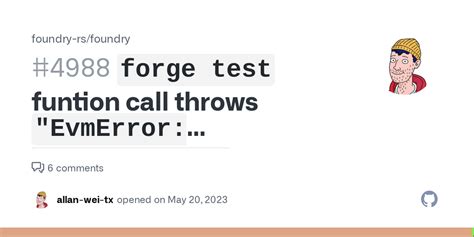- تاریخ انتشار : پنجشنبه ۲۵ بهمن ۱۴۰۳ - ۱۵:۱۲
- کد خبر : 1446 چاپ خبر
Ethereum: Received `NotActivated` error when debugging my foundry test
Ethereum Debugging Issue: “I got a ‘Not Activated’ error when debugging my Foundry test As a developer working with smart contracts on the Ethereum blockchain, I often run into problems during testing and debugging. In this article, we’ll look at the potential cause of the “Received ‘Not Activated’ while debugging my foundry test” error that
Ethereum Debugging Issue: “I got a ‘Not Activated’ error when debugging my Foundry test
As a developer working with smart contracts on the Ethereum blockchain, I often run into problems during testing and debugging. In this article, we’ll look at the potential cause of the “Received ‘Not Activated’ while debugging my foundry test” error that you’re experiencing.
Understanding the error
If an Ethereum test succeeds, it must first call the contract function with opcode CALDATALOAD to load data from the storage slot. Next follows one “CALLER” operation code to call the contract function. Then two opcodes PUSH0 and PUSH1 are executed to push the data onto the stack.
Problem: NotActivated error
The “NotActivated” error typically occurs when the test fails to properly activate the smart contract after executing the above code sequence. This can happen in several scenarios:
- Incorrect activation order

: If the test calls “CALDATALOAD” and then “CALLER”, but not the other way around, this can lead to an incorrect activation sequence.
- No or insufficient data storage: A contract function may require more data than was loaded with CALLDATALOAD. This can be caused by missing dependencies or insufficient disk space.
- Incorrect printing order: If the test does not correctly place the data in the tray, it may not activate.
Solutions and solutions
To solve this problem, you can try the following solutions:
Solution 1: Change the order of “CALDATALOAD” to “PUSH0”.
Replace the opcode sequence with this corrected version:
CALL LOAD DATA
CALLING
PUSH0
PUSH1
This should reactivate your smart contract.
Solution 2: Add PUSH0 before CALDATALOAD
Try adding “PUSH0” before “CALDATALOAD” to ensure the correct activation sequence:
CALL LOAD DATA
PUSH0
CALLING
Solution 3: Checking the data store
Make sure that the function of your contract requires data from the repository. If the contract expects additional data, you may need to add the LOADDATA operation code before calling it.
CALLING
LOADDATA(my contract address)
Solution 4: Check for missing dependencies or insufficient data
Make sure all dependencies are installed and sufficient in your test environment.
Solution 5: Use a second environment to test the foundry
If none of the above solutions work, you can try using a different foundry test environment or switch to a different test environment.
لینک کوتاه
برچسب ها
- نظرات ارسال شده توسط شما، پس از تایید توسط مدیران سایت منتشر خواهد شد.
- نظراتی که حاوی تهمت یا افترا باشد منتشر نخواهد شد.
- نظراتی که به غیر از زبان فارسی یا غیر مرتبط با خبر باشد منتشر نخواهد شد.
ارسال نظر شما
مجموع نظرات : 0 در انتظار بررسی : 0 انتشار یافته : 0